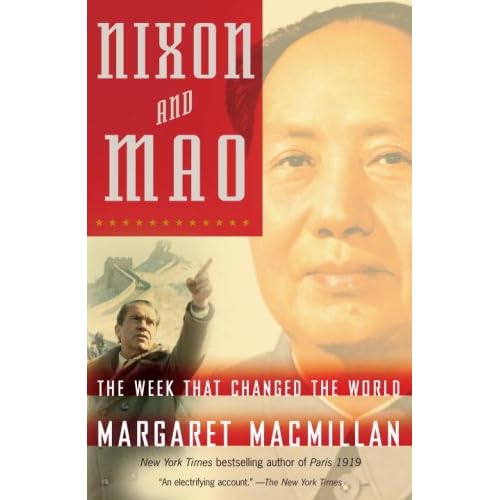
I thought about writing this post for my political blog.. but, I normally don't post book reviews there and so I'm taking a chance that this book review will interest a few. This book has been riveting to read. All of this history happened during my lifetime.. I was just too small to remember any of it. C said that the only thing that he really didn't like about President Nixon is that the Watergate hearings bumped his favorite program The Flintstones. You can see that point of view I'm sure. Anyway we were young, but are living in a time now where Nixon's opening of China has made great changes in the world we live in today. I honestly don't know that there would have been a lot of other men who would have been able to wrangle this deal other than Nixon and Kissinger. There were so many who were morally opposed to the trip.
William F. Buckley, someone I greatly admire, was invited on the trip by President Nixon and attended a banquet in China given in honor of the Americans by the Chinese. He had this to say about it, "It is unreasonable to suppose that anywhere in history have a few dozen men congregated who have been responsible for greater human mayhem that the hosts at this banquet and their spiritual colleagues, instruments all of Mao Tse-tung. The effect was as if Sir Hartley Shawcross had suddenly risen from the prosecutor's stand at Nuremberg and descended to embrace Goering and Goebbels and Doenitz and Hess, begging them to join with him in the making of a better world." An exaggeration.. Not hardly. Estimates suggest that Mao Tse-tung is responsible for the deaths either by political persecution or starvation of more than 40 Million people. There are many books that detail the brutality of Mao and his followers among them, the famous Life and Death in Shanghai extremely well written by Nien Cheng. My friend Circe also recommended a book I read several years ago called Mao's Last Dancer that chronicles the peasants struggle to avoid starvation due to the policies of Chairman Mao. At one point the author relates where as a child he realizes that his family is competing for their food sources with rats.. either they will starve or the rats will starve. It's heartbreaking.
And yet, Nixon wanted desperately to talk with the Chinese. His objective was complicated. The United States was in the middle of the Cold War with Russia; talking with the Chinese gave that government a sort of 3rd power status that created a thaw in U.S. / Russian relations and more caution on the part of Russia. Our relations with China after the Korean conflict and during Vietnam were difficult and possibly dangerous. Also, businessmen in the United States saw huge and lucrative markets and wanted in. There is no question that Sino/American trade has made untold fortunes for both countries. There were many other reasons Nixon wanted to go, but paramount among them was to ensure peace. That's a good reason I think. And, I don't know if Nixon thought of this because it wasn't mentioned in the book, but I think that it's obvious that contact with the western world has brought a measure of liberty to China.. not yet what one would hope for, but I think it's coming.
Nixon, who is remembered by most of the populace for Watergate, wanted to be remembered for this one week which he considered his greatest achievement.
If you're interested... read it and let me know what you think...

5 comments:
Ok, this is definitely going on my list. I just picked up "Mao's Last Dancer" and can't wait to read it.
(Also LOVED Life and Death in Shanghai - wasn't that amazing?)
I'll let you know how I like it!
That sounds really intense. I am always amazed by you.
Great post. I will read this some day, I know. I was just getting old enough to follow politics somewhat when Watergate popped. I followed it more closely than the events in China, which really should have had more of my attention. I would like to know more about this week and period in history.
I love your reviews!!!
Dang you are so smart! This is the kind of book review that reminds me I shouldn't just nurture my need to be entertained!
Fascinating! Pass it along...I thought I'd read every book on China while waiting for X. :) The sad irony about Mao was that he had such a deep love for China. If only we could chang history. Thank heavens Nixon developed those ties, though. It was very courageous.
Post a Comment